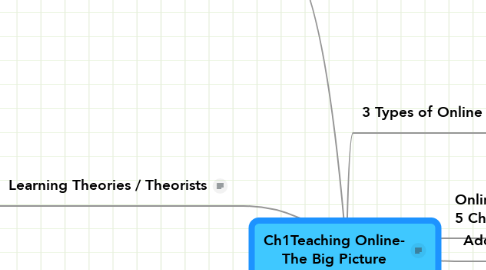
1. Preparing to Teach Online
1.1. old assumption-faculty will create; now difficult to get time / support to go online
2. 4 Stages of a Course
2.1. Course Beginnings-Starting Off
2.1.1. launch well; lay community groundwork
2.1.2. learners&faculty support each other in goals
2.2. Early Middle-Keep Ball Rolling
2.2.1. goal: learner engagement with content
2.2.2. lay base for complex projects and developing learner community
2.3. Late Middle-Let Go of the Power
2.3.1. learner focus on case studies, scenarios, other discipline / course issues
2.4. Closing Weeks-Pruning, Reflecting WrapUp
2.4.1. goal: end on positive learner experience
2.4.2. reflection of skills/concepts learned while being supported by and supporting learning community
2.5. Q: Can you see any potential conflicts with Boettcher and Conrad's 4 stages of a course as outlined here? Would all courses "fit" into this schema? Why/why not?
3. Learning Theories / Theorists
3.1. Vygotsky-Social Development
3.1.1. zone of proximal development; defines individual state of learning readiness
3.2. Dewey-Experiential Learning
3.2.1. ahead of his time- learner constructs knowledge on previous knowledge and that experiences are unique to each learner- teacher as facilitator
3.3. Piaget-Genetic Epistemology
3.3.1. cognitive structures- patterns of physical or mental action that underlie specific acts of intelligences corresponding to stages of child development
3.4. Bruner-Constructivism
3.4.1. Discovery Learning - active process of trial / error in which student uncovers underlying concepts
3.5. Seely Brown-Cognitive Apprenticeship
3.5.1. communities in online learning; cognitive apprenticeships
3.6. Schank-Schema Theory
3.6.1. "concepts of scripts, plans, and themes to handle story-level understanding" (p.15)
3.7. Which of these theories best aligns with your teaching style?
3.8. Which of these theories best aligns with your learning style?
4. Online Course Definition & 5 Characteristics
4.1. pedagogy- study of teaching
4.1.1. a sustained process whereby somebody(s) acquires new forms or develops existing forms of conduct, knowledge, practice and criteria from somebody(s) or something deemed to be an appropriate provider and evaluator. (Bernstein, 2007)
4.1.2. 3 elements of teaching & learning: 1) a learner, (2) someone or something appropriate guiding or directing the learner, and (3) the acquisition of conduct, knowledge, or practice by the learner. Boettcher, Judith V. (2010). The Online Teaching Survival Guide: Simple and Practical Pedagogical Tips (p. 6). Jossey-Bass. Kindle Edition.
4.2. course
4.2.1. a set of learning experiences within a specified time frame, often between six and fifteen weeks, in which learners, mentored by an instructor, are expected to develop a specific set of knowledge, skills, and attitudes. Learners are then assessed as to whether they achieve these goals and are assigned a grade for academic credit. Boettcher, Judith V. (p6)
4.2.2. "3 credit course = 20-25% of faculty load; about 8-10 hrs/wk" is a faculty dream in reality!
4.2.3. 5 characteristics of differences in online / FtoF courses (pp7-8)
4.2.3.1. 1. faculty role shifts to coaching / mentoring
4.2.3.2. 2. Asynchronous meetings
4.2.3.3. 3. Learners are more active
4.2.3.4. 4. Resources/spaces more flexible
4.2.3.5. 5. Assessment- continuous
4.2.3.6. Q: How do you perceive your learner role shifting with these stated differences?
5. 3 Types of Online Courses
5.1. Web facilitated
5.1.1. 1-29% online
5.1.2. Web-based facilitiation
5.2. Blended/hybrid
5.2.1. 30-79% online
5.2.2. substantial proportion of content delivered online thru discussions; some FtoF mtgs
5.3. Online
5.3.1. 80-100% online
5.3.2. most or all of the content is delivered online
5.4. Q: Scan "typical description" + table 1.1 on p. 9- In which type of online course do you think you'd best perform as a learner? Why?
5.5. New node
6. Added Definitions
6.1. Ch1 K&R
6.1.1. Key- eLearning, distance ed., virtual classrooms, asynchronous, synchronous, web site, URL, CMS, LMS, blended course, discussion boards, Wiki, emoticon, browser, download, WYSIWYG, forum
6.2. Ch2 K&R
6.2.1. operating system, web server, cloud computing, chat, ISP, wireless/wi-fi, smart phone, webmasters, web-enhanced, application service provider, blog, Web 2.0, hotspots, SMS, mailing list, open source software, multimedia; note "important" note on p. 42! (not everyone can know everything!)
